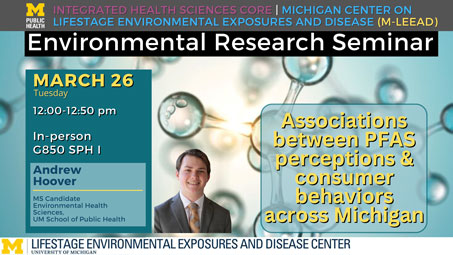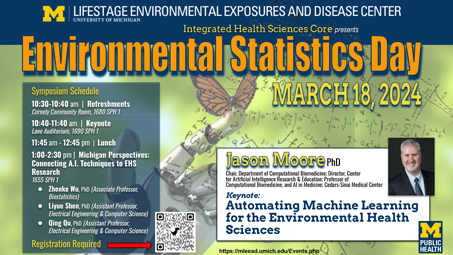About M-LEEaD
Michigan Center on Lifestage Environmental Exposures and Disease (M-LEEaD) is a National Institute of Environmental Health Sciences Core Center. M-LEEaD improves our understanding of the contribution of environmental exposures toward the etiology of chronic diseases and conditions like asthma, neurodegenerative diseases, metabolic syndrome and prematurity.
Upcoming events
See all eventsComing soon!
Video from recent events
See more video from recent events
“Associations between PFAS perceptions & consumer behaviors across Michigan”
With Andrew Hoover (MS Candidate, Environmental Health Sciences, UM School of Public Health)
Tue Mar 26 2024

“Automating Machine Learning for the Environmental Health Sciences”
With Jason Moore, PhD (Cedars-Sinai Medical Center, Los Angeles, CA)
Mon Mar 18 2024

“Connecting Artificial Intelligence Techniques to Environmental Health Science Research”
With Zhenke Wu, PhD (Associate Professor, Biostatistics), Liyue Shen, PhD (Assistant Professor, Electrical Engineering & Computer Science), and Qing Qu, PhD (Assistant Professor, Electrical Engineering & Computer Science)
Mon Mar 18 2024
Member Updates
More member updatesApril 5 2024: The Environmental Statistics Day Symposium on March 18, 2024, at SPH was an insightful event... Read more
March 7 2024: The Partnerships for Environmental Public Health (PEPH) 2024 meeting bought grantees and partners within the... Read more
February 6 2024: Have you caught any of M-LEEaD’s Residents & Researchers (R&R) Seminars? The R&R series, a... Read more
January 10 2024: M-LEEaD’s Community Engagement core is excited to announce our “Partnership Development Program” (PDP). The PDP... Read more
December 12 2023: This year’s American Public Health Association (APHA) conference from November 12-15 was organized around the... Read more
November 3 2023: The 2023 NIEHS Environmental Health Sciences (EHS) Core Centers in-person meeting was hosted by the... Read more
